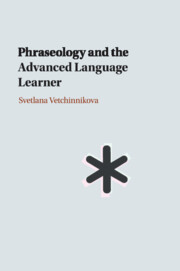Book contents
- Phraseology and the Advanced Language Learner
- Phraseology and the Advanced Language Learner
- Copyright page
- Contents
- Figures
- Tables
- Acknowledgements
- Abbreviations
- Chapter 1 Introduction
- Chapter 2 From a Unit of Meaning to a Meaning-Shift Unit
- Chapter 3 L2 Use and Processing of Multi-Word Units
- Chapter 4 Triangulating Usage, Exposure and Processing
- Chapter 5 Meaning-Shift Units in L2 Learning and Use: Usage vs. Exposure
- Chapter 6 Meaning-Shift Units in L2 Processing: Usage vs. Word Association Responses
- Chapter 7 Towards the Bigger Picture
- Book part
- References
- Index
Chapter 3 - L2 Use and Processing of Multi-Word Units
Published online by Cambridge University Press: 18 November 2019
- Phraseology and the Advanced Language Learner
- Phraseology and the Advanced Language Learner
- Copyright page
- Contents
- Figures
- Tables
- Acknowledgements
- Abbreviations
- Chapter 1 Introduction
- Chapter 2 From a Unit of Meaning to a Meaning-Shift Unit
- Chapter 3 L2 Use and Processing of Multi-Word Units
- Chapter 4 Triangulating Usage, Exposure and Processing
- Chapter 5 Meaning-Shift Units in L2 Learning and Use: Usage vs. Exposure
- Chapter 6 Meaning-Shift Units in L2 Processing: Usage vs. Word Association Responses
- Chapter 7 Towards the Bigger Picture
- Book part
- References
- Index
Summary
Chapter 3 offers an interdisciplinary overview of research on multi-word units in second language (L2) processing and use. It is motivated by a long-standing puzzle in the field of second language acquisition suggesting that while the idiom principle is the main mechanism of language production in native speakers, non-native speakers cannot benefit from it to a similar degree. The chapter shows that researchers are not unanimous in assessing the degree to which learners operate on the idiom principle and raises a few problems which might be obscuring such operation in commonly used research designs, such as a focus on specific multi-word units rather than co-selection as such, questionable representativeness of reference corpora and inability of statistical measures to capture abstracted associations. The chapter concludes by offering an alternative interpretation based on the concept of approximation adopted from studies of English as a lingua franca.
Keywords
Information
- Type
- Chapter
- Information
- Phraseology and the Advanced Language Learner , pp. 38 - 65Publisher: Cambridge University PressPrint publication year: 2019
